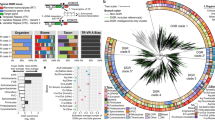Abstract
The study of human pathogens, their genomes and their evolution has been revolutionized by the introduction of ancient DNA techniques both in the lab and in silico. Today, palaeogenomic research can reconstruct microbial genomes starting from as much as a couple of reads detected during screenings. With every year, the number of organisms and genomes increases, and with it the field’s power to answer a wide range of questions pertaining to the evolution and the dynamics of studied pathogens.
Similar content being viewed by others
Literatur
Spyrou MA, Bos KI, Herbig A et al. (2019) Ancient pathogen genomics as an emerging tool for infectious disease research. Nat Rev Genet 20: 323–340
Guellil M, Keller M, Dittmar JM et al. (2022) An invasive Haemophilus influenzae serotype b infection in an Anglo-Saxon Plague victim. Genome Biol 23: 22
Houldcroft CJ, Beale MA, Breuer J (2017) Clinical and biological insights from viral genome sequencing. Nat Rev Microbiol. 15: 183–192
Author information
Authors and Affiliations
Corresponding author
Additional information
Danksagung
Die Autoren danken dem Estonian Research Council für finanzielle Unterstützung im Rahmen des Projekts PRG1027.
Meriam Guellil 2008–2012 Archäologie- (BA) und Biologiestudium an der Universität Wien, Österreich. 2012–2013 Masterstudium in Osteologie (Msc) an der Universität Sheffield, UK. Anschließend Research Associate an der Universität York gefolgt von einem Doktoratstudium an der Universität Oslo, Norwegen. 2018 Promotion in Genomik. Seit 2018 Postdoc am Institut für Genomik der Universität Tartu, Estland.
Marcel Keller 2008–2013 Studium der Biologie (BSc, MSc) an der LMU München, anschließend Doktorand am Dept. Archäogenetik, Max-Planck-Institut für Menschheitsgeschichte, Jena. 2020 Promotion an der Universität Jena. Seit 2019 Postdoc am Institute of Genomics der Universität Tartu, Estland. Seit 2022 Wissenschaftlicher Mitarbeiter am Dept. Anthropologie, Institut für Rechtsmedizin, Universität Bern, Schweiz.
Rights and permissions
About this article
Cite this article
Guellil, M., Keller, M. Rekonstruktion mikrobieller Evolution durch Sequenzierung alter DNA. Biospektrum 28, 287–290 (2022). https://doi.org/10.1007/s12268-022-1766-x
Published:
Issue Date:
DOI: https://doi.org/10.1007/s12268-022-1766-x




